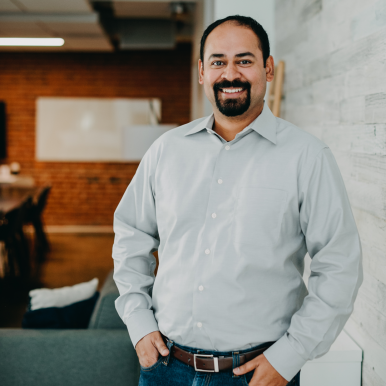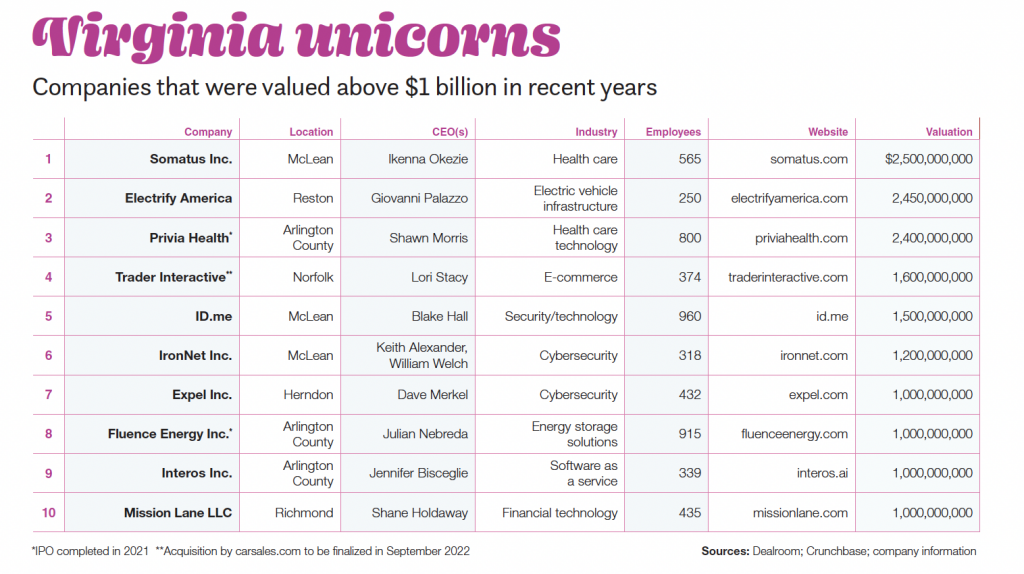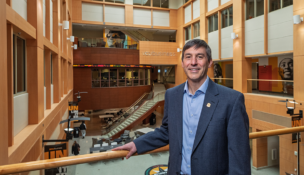No myth
Virginia companies share their journeys from startups to unicorns
No myth
Virginia companies share their journeys from startups to unicorns
Last year, Lori Stacy found herself leading a unicorn.
The CEO of Norfolk-based Trader Interactive, an online marketplace for boats, recreational vehicles, motorcycles and other niche vehicles, Stacy helped shepherd the company through its June acquisition by Australian auto retailer carsales.com Ltd.
The Australian company paid $624 million for 49% of the business in August 2021, making it the company’s second largest shareholder. Then carsales.com bought the rest of Trader Interactive this summer for $809 million. At the time of the 2021 transaction, Trader Interactive’s valuation was estimated at well above $1 billion — making it, in venture-capital parlance, a unicorn, or a privately held startup with a total market value of $1 billion or more.
While nothing on the surface changed, Trader Interactive’s unicorn status did confer some bonuses — and challenges.
“Any time valuation is public, personally I don’t love that,” Stacy says. For one thing, she says, the attention draws poachers of tech talent, already scarce in Hampton Roads.
But she does allow that the status is great for morale. “Any time there’s success, it brings confidence and that’s great for our employees. They like to win and celebrate those wins,” Stacy says. “And a lot of our customers are excited.”
The influx of cash that valuation brought was nice too, Stacy acknowledges. “It gives us investment opportunities to try new things to support our clients. When you’re struggling to grow, resources are more scarce,” she says. But after CarSales.com’s investment, there was “a lot more room for experimenting. So, it’s a win all around.”
Becoming a unicorn has been the brass ring sought by tech companies ever since Silicon Valley venture capitalist Aileen Lee coined the term in 2013. At the time, she counted just 39 unicorns, primarily consumer tech companies such as Facebook Inc. (now Meta Platforms Inc.) and Google LLC. That list has since shot upward. According to Crunchbase, a database of venture capital information, more than 1,100 unicorn companies now exist worldwide, with 612 in the U.S., concentrated largely along California’s coastal tech corridor.

Australian auto retailer carsales.com. Photo by Mark Rhodes
Virginia has its own stable of unicorns. According to international venture capital tracking firm Dealroom.co and other sources, at least 10 Virginia companies reached unicorn status in the last few years, though two went through IPOs last year and are now publicly traded. (See chart, Page 25.)
That elite list spans the state, from McLean-based kidney-care company Somatus Inc., valued at $2.5 billion, to Richmond-based fintech firm Mission Lane LLC, valued at $1 billion.
As in Silicon Valley, Virginia’s unicorns often have technology at their core.
“Virginia may not be Silicon Valley, but it is, pardon the phrase, a sort of Fiber Alley,” says David Touve, senior director of the Batten Institute at the University of Virginia’s Darden School of Business.
Touve points to Northern Virginia’s status as a cybersecurity hub. It’s also been a nexus of internet activity since the 1990s heyday of America Online’s Dulles headquarters, long before Amazon.com Inc. announced it was locating its HQ2 East Coast headquarters in Arlington County.
Virginia offers a lot of advantages for startups to succeed, says Dr. Ikenna Okezie, the Harvard-educated co-founder and CEO of Somatus, an artificial intelligence-driven kidney care startup based in McLean that recently hit a valuation of $2.5 billion. Okezie cites “great neighborhoods, school systems, access to great public and private sector jobs.” Plus, Virginia has a lot of natural beauty and “it’s geographically situated to attract top talent both locally and nationally,” he says.
Like the rest of the world, the commonwealth has seen its portfolio of unicorns grow in the past few years. Touve says that increase may be due to a “historical accident: the combination of greater amounts of private capital being managed by investors” — think inexpensive money during an era of low interest rates — “and the greater scrutiny of going public may have led to companies delaying [or] even avoiding a listing on a major exchange.”
Another possibility is that some of those unicorns … aren’t.
Stanford University professor Ilya A. Strebulaev caused a stir with a 2017 study arguing that unicorns on average are worth about half what they claim to be, largely because a handful of investors get sweetheart deals compared with other investors. In other words, some unicorns might be just $500 million horses with horns glued to their heads. Caveat emptor.
Trading up
Trader Interactive started as a publisher of modest newsprint booklets of ads for vehicles like RVs, motorcycles and boats. Its larger corporate sibling, Autotrader.com Inc., did the same for cars.
Stacy joined Trader Interactive in 1997 as a sales manager in her home state of Florida. Armed with a new bachelor’s degree in English, Stacy had sent her résumé to every publication she could find. One bit — Autotrader. She was initially reluctant to take the job. Sales wasn’t what she’d had in mind. What the company liked most about her résumé wasn’t her writing — it was her background working in retail sales and management for stores like The Body Shop and The Limited.
Still, she signed on to the company, which at the time was owned by Norfolk-based Landmark Media Enterprises LLC, as a sales manager. She excelled. After several promotions, in 2007 Stacy was tapped to lead the non-automotive digital side of the business.
To some, the role might have seemed like a step down. The non-auto segment — cycles, RVs and boats — was minuscule compared with the auto side. And back in 2007, the company’s online sales were a tiny fraction of its print media revenue.
But the company was about to go through a metamorphosis. Landmark began selling off assets, including its flagship property, The Weather Channel, which it reportedly sold for $3.5 billion to NBCUniversal Media LLC and two private equity firms.
Autotrader, now based in Atlanta and a subsidiary of Cox Enterprises Inc., became a top player in online car sales; it owns Kelley Blue Book and Autotrader.com, among other properties.
Its non-auto business was spun off as a new company, Dominion Web Solutions. Amid dwindling print ad sales, Stacy worked to push online sales to the forefront. “We could see where the customers were going,” she says.

Over the next few years, Dominion Web Solutions methodically expanded its online footprint, segment by segment, dealership by dealership. Eventually it shifted all its sales to the web. By 2010, the various verticals had been brought under one roof. The business expanded into new niches, including heavy equipment and commercial trucks.
In 2017, French investment company Eurazeo bought the business for $680 million. Stacy was named CEO of he renamed Trader Interactive. Under her leadership, the company doubled down on building online marketplaces for niche transportation purchases. Four years later, Eurazeo sold half its stake in the business to Melbourne, Australia-based carsales.com for $624 million, giving the Australian firm a toehold on the North American market and bringing Trader Interactive a $1 billion-plus valuation.
In June, impressed with Trader Interactive’s performance, carsales.com announced it would buy the rest of the Norfolk company, paying an additional $809 million. The deal was scheduled to close in September.
So, what’s next for the company? Stacy is focused on bringing the purchasing process completely online within the Trader Interactive system. Online shoppers will be able to search for features they want, locate vehicles, ask questions, manage paperwork, purchase and arrange delivery — all within an app or web browser. “Our industries are going to look really different a few years from now,” Stacy says. “I’m super excited about that.”
Mission first
One could be forgiven for thinking that after a big acquisition, unicorn leaders might be popping Champagne corks and looking to cash out, but leaders of successful companies like Trader Interactive are typically focused on measures other than market valuations, says U.Va.’s Touve.
“Getting rich is a weak or at least an unfortunate motive for founders,” he adds. “The more important goals are to create a great company that provides a compelling solution to a meaningful problem.”
For one of Virginia’s newest unicorns, the solution — and the problem — were keys to its creation. Electrify America, based in Reston, was born out of a legal case. In 2016, Volkswagen AG, the German auto giant, agreed to pay up to $14.7 billion to settle charges that it had for years cheated on emissions tests on its diesel cars. The settlement with U.S. federal and California state agencies included a provision that Volkswagen would fund infrastructure for electric vehicles.
Since then, Electrify America, the business launched to achieve this, has focused on building networks of high-speed charging stations that will work with any electric vehicle on the market. The company’s goal is to make filling up an electric car as straightforward as gassing up an internal combustion vehicle — just drive up and plug in, paying via a mobile app wallet.
That simple aim has proved complicated, says Matthew Nelson, Electrify America’s director of government affairs. Take for example the challenges associated with developing charging stations that can communicate seamlessly with different electric vehicles’ software, from Chevys to Fords to Teslas, while powering up their batteries in a quarter-hour or so — not to mention interfacing with banks and credit card systems.
“It took years to get this to work,” Nelson says. A testing lab in Reston hammers out many of the technical aspects of working with so many different systems before they are put into service.
With many of those bugs stamped out, Electrify America has opened over 800 stations with more than 2,500 chargers in 46 states, including two coast-to-coast routes, with plans to more than double that by 2026. It’s partnered with automakers including Kia, Hyundai and Ford to offer complimentary charges for some models.
Being based in Northern Virginia gives the company quick access to international airports and well-trained technical talent, Nelson says. It’s also close to Congress and federal agencies, as well as partners such as South Korean charger manufacturer SK Signet, whose American arm is headquartered in the region.
“I love the fact that we build things,” adds Nelson, whose background is in research and development industries that can take years to get to market. “Every week we open three or four stations. They exist. You can visit them.”
In June 2022, German electronics firm Siemens AG paid $450 million for a minority stake in Electrify America, marking Electrify America’s first outside investment. That vote of support placed Electrify America’s market valuation at $2.45 billion.
“We have a startup feel in some ways, but not in other ways,” Nelson says. “We aren’t motivated by the goal of going public. … We are a company built around the idea of solving a problem.”
Keeping score
For Expel Inc., a cybersecurity firm based in Herndon, the problem to solve is less technical and more interpersonal.
Expel co-founder and Chief of Staff Yanek Korff says that when he and his partners launched the business in 2016, “we were more excited about building a … company from a culture perspective than a security perspective. You could say it was about the journey.”
Korff and Expel’s other two co-founders worked at another Northern Virginia cybersecurity startup, Mandiant, which focused on defending systems against attacks by nation-states — “think China and Russia and Iran and North Korea,” Korff says.
About 18 months after Mandiant’s 2013 acquisition by FireEye, a Silicon Valley security firm, for $1 billion, Korff and two Mandiant colleagues, Dave Merkel and Justin Bajko, joined forces on a new venture.
They were inspired by a 2015 tweet by analyst Rick Holland. “I think the MSSP [managed security service provider] market is ripe for disruption,” Holland tweeted, comparing the industry to pre-Uber taxi services: “Customers aren’t happy.”
The three co-founders decided to pursue a company that would offer better service and innovations to cybersecurity clients, allowing customers to outsource technical expertise while maintaining their existing systems.
Getting started wasn’t easy. Access to capital and support was a major hurdle. “In Virginia, there aren’t a lot of companies that do this, that start from scratch and get venture funding and aspire to build a company that’s worth a lot of money someday,” Korff observes.
Drawing on their experiences, they found connections. “We were just barely knowledgeable enough to get things rolling,” Korff says. Working through VC firms, they built a network of informal advisers, including other founders, stretching from Northern Virginia to California.
The new partners encountered plenty of skepticism. During spring 2016, they met with close to 50 potential investors, Korff recalls. Previous startups had promised and failed to deliver strong network security and satisfied customers, but VC firms that had looked hard at the industry saw merit in Expel’s approach. By that summer, Expel had six investors, led by Washington, D.C.-based Paladin Capital Group, a tech investment firm.
Five years, many clients and five funding rounds later, Expel had convinced investors that it consistently was hitting targets for growth and quality. In November 2021, a $140 million investment from Paladin and CapitalG, Alphabet Inc.’s independent growth fund, brought the total invested in Expel to $257 million. Expel announced it had received a $1 billion valuation — making it a unicorn.
Now the company is focused on maintaining a healthy corporate culture in a working world that’s gone through a revolution. Before the pandemic, 70% of Expel’s workforce was based in Herndon, with the rest composed of remote workers from around the country. By this year, those proportions had reversed.
“That’s a different company,” Korff says, one that requires different approaches. On the plus side, it’s easier to recruit remote talent, no matter what coast they may be on. On the negative side, it can be tricky to build teams and camaraderie when members interact only through Zoom calls.
“We figured if we build a good company where people love to work and we know we’re solving a real problem, the outcome will be good,” Korff says. “The mindset wasn’t, ‘We have to hit this score.’ It was more, if we do this, the scoreboard will take care of itself.”
P



















